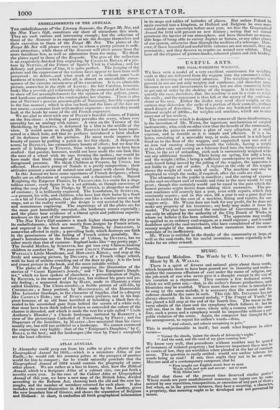USEFUL ARTS.
THE COAL-WEIGHING WAGGON.
WE have seen a model of a very excellent contrivance for weighing coals as they are delivered from the waggon into the consumer's cellar, which is deserving of universal adoption. The weighing-machines at present in use are not only weighty and cumbrous, and therefore trou- blesome to use and inconvenient to carry, but are also constantly liable to get out of order by the shaking of the ivaggon. It is far more fre- quently the case, therefore, that the machine is not in a state to weigh the coals ; and the consumer is thus left at the mercy of the coal-mer- chant or his men. Either the dealer may send short weight, or the carman may disburden the sacks of a portion of their contents, without much danger of detection. The horses also are burdened with an ad- ditional weight of 5001bs., for weights and machine, which are in nine cases out of ten useless.
The contrivance which is designed to remove all these disadvantages, is the invention of Mr. Wsiss, the ingenious mechanician of surgical instruments ; who, with no other view than the benefit of the community, has taken the pains to contrive a plan of easy adoption, at a small expense, and as durable as it is simple and efficient. It is a ba- lance, consisting of a moveable trap, or scale, inserted in a tail-board fixed on to the floor of the waggon, and supported upon one end of an iron rod running along underneath the vehicle, having a weight at its other end, and resting on a fulcrum fixed into the hinder axletree. Thus, in the act of unloading, each sack is successively weighed with- out any additional trouble. There being no spring, but only a lever, and the weight (401bs.) being a sufficient counterpoise to prevent the scale-board being moved by the jolting of the waggon, the apparatus is not liable to get out of order. A register at the side of the waggon shows the weight of each sack of coals. The machine may also be employed to weigh the sacks, if required, after the coals are shot.
The advantage to the public is manifest ; and the saving of expense
to the coal-merchant and of trouble and time to the men would be very great ; though this certainly would not be equal to the gain which dis- honest persons might derive from robbing their customers. The pre- sent machines will scarcely last a year, even with repairs, which they constantly require ; and in this case, 101. a year is not a great deal too much to reckon for the cost of a machine, fitting and repairs, for one waggon only. Mr. WEIss does not look for any profit, for he does not make any property of his invention; any body may make it from his model. The plan has received the sanction of Government ; but it can only be adopted by the authority of the City Board of Works, to whom we believe it has been submitted. The apparatus may readily be applied to an ordinary coal-waggon, at a small expense ; and it would doubtless satisfy the coal-merchants, who have complained of the unne- cessary weight of the machine, and whose customers have reason to complain of its inefficiency. Mr. WEIss is entitled to the thanks of the community at large, as well as the coal-trade, for his useful invention ; more especially as he looks for no other reward.


























 Previous page
Previous page